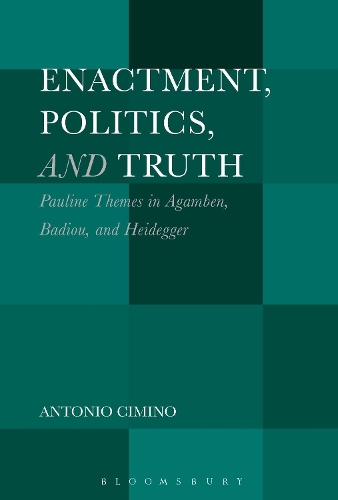
Enactment, Politics, and Truth: Pauline Themes in Agamben, Badiou, and Heidegger
(Hardback)
Publishing Details
Enactment, Politics, and Truth: Pauline Themes in Agamben, Badiou, and Heidegger
By (Author) Dr. Antonio Cimino
Bloomsbury Publishing PLC
Bloomsbury Academic USA
26th July 2018
United States
Classifications
Tertiary Education
Non Fiction
Western philosophy from c 1800
Christianity
Theology
227
Physical Properties
Hardback
192
Width 152mm, Height 229mm
426g
Description
Enactment, Politics, and Truth explores the interpretations of Saint Paul by Giorgio Agamben, Alain Badiou, and Martin Heidegger. These interpretations are characterized by substantial thematic overlap that can be traced back to a key subject: the articulation of Pauline faith (pistis). Although each thinker approaches the issue from a different angle, they all interpret Pauline pistis by focusing on how it is enacted, articulated, and expressed in Saint Pauls concrete situation. Antonio Cimino sheds light on why Agamben, Badiou, and Heidegger address Pauline pistis and what kind of philosophical motives underlie their readings.
Reviews
Antonio Cimino brings clarity to this larger conversation by isolating the Pauline theme of pistis as a way of limiting the conversation partners. This leads him to Martin Heidegger, Alain Badiou, and Giorgio Agamben This book, in a mere 163 pages, distills, analyzes, critiques their work, and challenges their conclusions. * Reading Religion *
Cimino's book is top-notch scholarship coupled with significant and enriching philosophical analysis, and is essential reading for anyone interested in not only Continental thinking regarding St. Paul, but also Continental thinking and its Postmodern elements in general. * Notre Dame Philosophical Reviews *
Cimino's Enactment, Politics, and Truth is a seminal work on the 'Pauline Renaissance' in 20th-century continental philosophy. Cimino provides a systematic overview of the reappropriation of the Pauline epistles in Heidegger, Agamben, and Badiou, showing that in contrast to Nietzsche's dismissive attitude toward the apostle, all three thinkers discover in Paul key elements for their own philosophical projects. Exploring their different but interconnected ways of reading Paul in the context of their search for 'postmetaphysical' modes of thinking, Cimino's book develops into a profound and insightful reflection on the complicated exchange between faith and philosophy in contemporary continental thought. * Jussi Backman, Senior Lecturer in Philosophy, University of Jyvskyl, Finland *
The excellent book you hold in your hand is an original and challenging intervention which transforms the current struggle to situate the Pauline legacy in relation to continental philosophy. While recent philosophy has given birth to a new Paulinist politics by distancing the apostle from Nietzsches famous attack on Paul as a mere Platonism for the masses, Cimino moves in precisely the opposite direction. He argues against contemporary messianisms, philosophies of the event, and the fetish for pure performativity of language, claiming that we find in a philosophical Paul precisely a refashioned Platonic politics of trust, which we ourselves need now more than ever. Ciminos is a profound, moving, and perplexing new synthesis that demands respect as history, as philosophy, and finally as a plea for a new politics. * Ward Blanton, Reader in Biblical Cultures and European Thought, University of Kent, UK *
Author Bio
Antonio Cimino is Assistant Professor in the History of Contemporary Philosophy at Radboud University in Nijmegen, The Netherlands. His books include Phnomenologie und Vollzug: Heideggers performative Philosophie des faktischen Lebens (2013) and, as co-editor, Rethinking Faith: Heidegger between Nietzsche and Wittgenstein (Bloomsbury, 2016).
